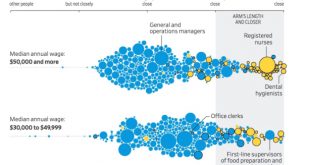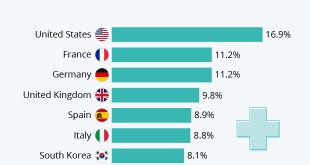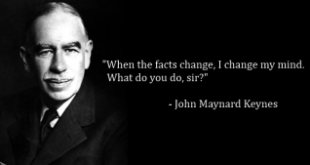Read More »
Dumb and Dumber — the Chicago version
from Lars Syll A couple of years ago, in a lecture on the US recession, Robert Lucas gave an outline of what the New Classical school of macroeconomics today thinks on the latest downturns in the US economy and its future prospects. Lucas starts by showing that real US GDP has grown at an average yearly rate of 3 per cent since 1870, with one big dip during the Depression of the 1930s and a big – but smaller – dip in the recent recession. After stating his view that the US recession that...
Read More »Job contagion
from David Ruccio source Evidence thus far suggests that low-wage workers, most of whom can’t perform their labor remotely, are more likely to either lose their jobs (because of shutdowns, especially in leisure and hospitality) or be forced to continue to work in close proximity to others (either coworkers or customers), and therefore are more likely to contract coronavirus. Moreover, if and when the economy recovers, employers are likely to adopt labor-saving technologies and other...
Read More »Maths and economics
from Lars Syll Many American undergraduates in Economics interested in doing a Ph.D. are surprised to learn that the first year of an Econ Ph.D. feels much more like entering a Ph.D. in solving mathematical models by hand than it does with learning economics. Typically, there is very little reading or writing involved, but loads and loads of fast algebra is required. Why is it like this? … One reason to use math is that it is easy to use math to trick people. Often, if you make your...
Read More »Unemployment in US and UK ‘may be worse than in Great Depression’
from today’s Guardian Unemployment in Britain and the US could surpass the levels reached during the 1930s Great Depression within months as the coronavirus crisis crushes the global economy, a former Bank of England official has warned. In a stark forecast as job losses mount around the world, David Blanchflower, professor of economics at Dartmouth College in the US and a member of the Bank’s interest rate-setting monetary policy committee during the 2008 financial crisis, said...
Read More »Health expenditure as a percentage of GDP
Corona: a positive agenda
The eight hour working day was a long standing aim of organized labor. For decades it seemed unattainable. ‘International competition’ often was a main reason why countries stubbornly refused to introduce it. But from 1915 on and starting in Uruguay it suddenly spread all over the world. Within a few years, in many countries the six day eight hour working week had become the new normal. Corona won’t end the world. After World War I and despite the Spanish flu many countries rapidly...
Read More »Good reasons to become a Keynesian
from Lars Syll Until [2008], when the banking industry came crashing down and depression loomed for the first time in my lifetime, I had never thought to read The General Theory of Employment, Interest, and Money, despite my interest in economics … I had heard that it was a very difficult book and that the book had been refuted by Milton Friedman, though he admired Keynes’s earlier work on monetarism. I would not have been surprised by, or inclined to challenge, the claim made in 1992 by...
Read More »Active cases, recovered cases and deaths
“It’s a lose-lose” for workers
from David Ruccio It’s now an almost daily occurrence: Donald Trump starring in the White House pandemic briefings, flanked by business executives—from Walgreens, CVS, Target and a host of laboratory, research, and medical-device corporations—to form a mutual admiration society.* The various scientists, public-health experts, and emergency personnel, the ones people want to hear from, are accorded third rank. And American workers are nowhere to be seen—or heard—even when, as on 24 March,...
Read More » Real-World Economics Review
Real-World Economics Review







